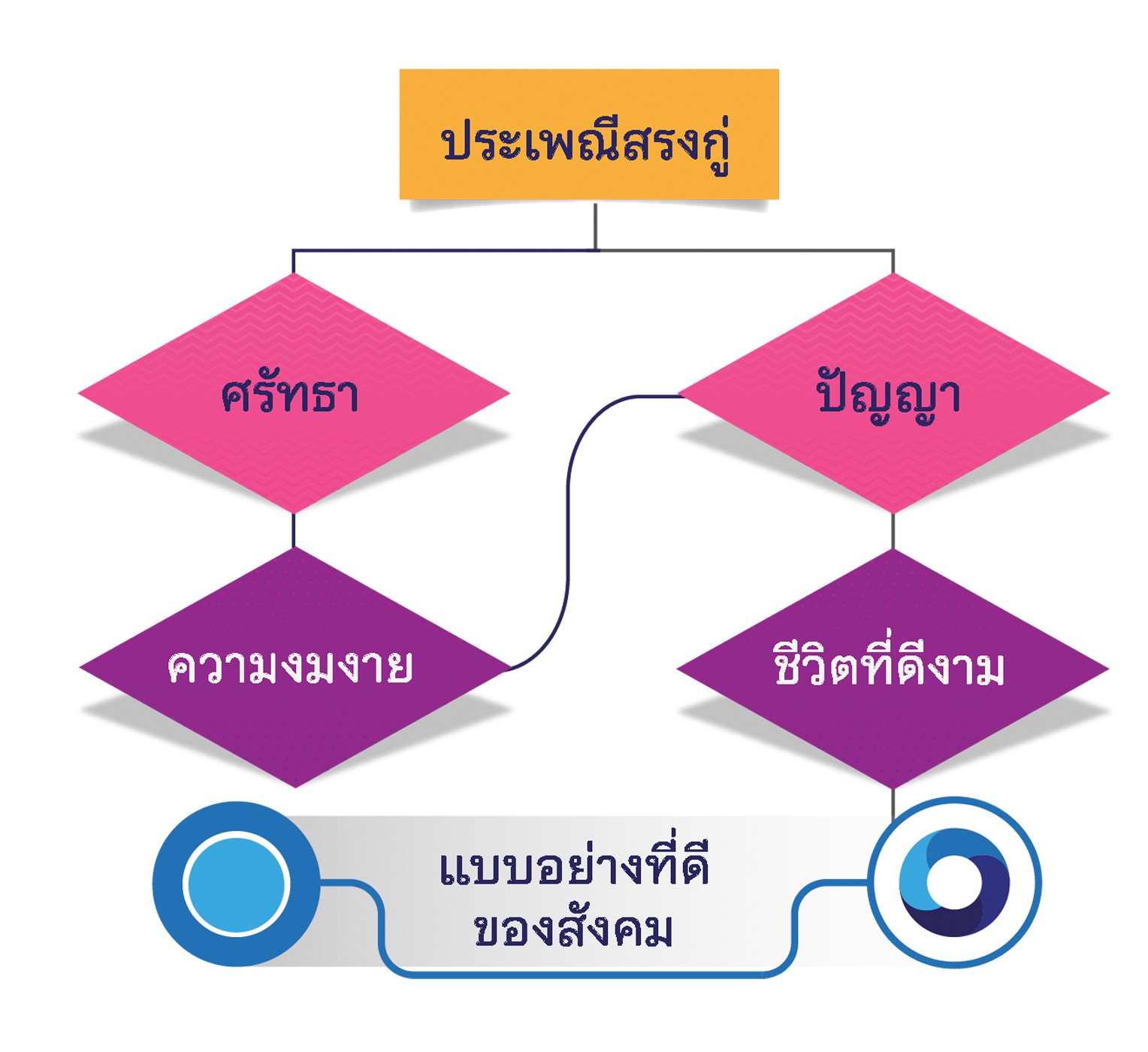An Analysis of Boon Song Ku Tradition at Ban Kluay Temple, Suan Chik Sub-District, Si Somdet District, Roi Et Province
Main Article Content
Abstract
The purposes of this research were 1) to study the philosophical concepts of the Boon Song Ku tradition; 2) to study the Boon Song Ku tradition at Ban Kluay Temple, Suan Chik Sub-district, Si Somdet District, Roi Et Province; 3) to analyze the Boon Song Ku tradition at Ban Kluay Temple. This study was carried out by the means of qualitative research by studying primary, and secondary sources and other relevant research papers. There was a group of 20 key informants. The obtained data were interpreted by descriptive analysis based on the inductive approach.
The research results revealed that:
1. The philosophical principles include the principles of Buddhist ethics, which judge actions as good, bad, appropriate, or inappropriate through a method based on karmic principles that emphasize intention. They also use a pragmatic approach, where goodness, badness, and various values arising for oneself and society through practical way.
2. The tradition of the "Boon Song Ku Wat Ban Kluay" festival reveals that this location houses the head of an ancient Buddha statue, believed to have been created during the Khmer era. The villagers hold the belief that it is a sacred object worthy of worship. This belief has been passed down through generations, leading to the establishment of an important tradition held during the Songkran festival every year.
3. The results of the analysis are as follows: 1) the values in the Boon Song Ku tradition are aimed at the consequences of human actions through various behaviors, divided into two categories: external values and intrinsic values. 2) The principles of Buddhist ethics include the principle of karmic determinism. Participating in the tradition with a benevolent and faithful intention results in positive karma. Analyzing according to pragmatic principles reveals that goodness and badness arise from our own actions. 3) There are three levels of objectives: 1) the basic level involves adhering in the framework of the precepts, specifically the Five Precepts, to ensure social peace. 2) The intermediate level involves practicing of the Ten Wholesome Courses of Action, refraining from harming oneself and others, and cultivating a compassionate heart. 3) The advanced level involves self-development based on the principle of wisdom.
Article Details

This work is licensed under a Creative Commons Attribution-NonCommercial-NoDerivatives 4.0 International License.
เพื่อให้เป็นไปตามกฎหมายลิขสิทธิ์ ผู้นิพนธ์ทุกท่านต้องลงลายมือชื่อในแบบฟอร์มใบมอบลิขสิทธิ์บทความ ให้แก่วารสารฯ พร้อมกับบทความต้นฉบับที่ได้แก้ไขครั้งสุดท้าย นอกจากนี้ ผู้นิพนธ์ทุกท่านต้องยืนยันว่าบทความ ต้นฉบับที่ส่งมาตีพิมพ์นั้น ได้ส่งมาตีพิมพ์เฉพาะในวารสาร วิชาการธรรม ทรรศน์ เพียงแห่งเดียวเท่านั้น หากมีการใช้ ภาพหรือตารางของผู้นิพนธ์อื่นที่ปรากฏในสิ่งตีพิมพ์อื่นมาแล้ว ผู้นิพนธ์ต้องขออนุญาตเจ้าของลิขสิทธิ์ก่อน พร้อมทั้ง แสดงหนังสือที่ได้รับการยินยอมต่อบรรณาธิการ ก่อนที่บทความจะได้รับการตีพิมพ์References
จรัส ลีกา และคณะ. (2563). การวิเคราะห์คติความเชื่อในการอนุรักษ์ป่าชุมชนของคนอีสาน. วารสารบัณฑิตศึกษามหาจุฬาขอนแก่น, 7(2), 133-149.
เดือน คำดี. (2534). พุทธปรัชญา. กรุงเทพฯ: โอ.เอส.พริ้นติ้งเฮ้าส์.
พระมหากันต์ วฑฺฒนวํโส (มโนวัฒนันท์). (2537). การศึกษาเปรียบเทียบแนวความคิดเรื่องเกณฑ์การตัดสินทางจริยธรรมในจริยศาสตร์ของค้านท์กับในพุทธจริยศาสตร์ตามทรรศนะของพระเทพเวที (ป.อ.ปยุตฺโต). (วิทยานิพนธ์พุทธศาสตรมหาบัณฑิต). พระนครศรีอยุธยา: มหาวิทยาลัยมหาจุฬาลงกรณราชวิทยาลัย.
พระมหานพดน สิรินฺธโร (สิงหัน). (2561). การศึกษาความเชื่อและพิธีกรรมที่เกี่ยวกับการบูชาพระธาตุโพนทองที่มีอิทธิพลต่อชุมชน ตำบลหนองนาคำ อำเภอเมือง จังหวัดอุดรธานี. (วิทยานิพนธ์พุทธศาสตรมหาบัณฑิต). พระนครศรีอยุธยา: มหาวิทยาลัยมหาจุฬาลงกรณราชวิทยาลัย.
พระมหาประสพฤกษ์ จารุวาโท (รัตนยงค์). (2550). การศึกษาเชิงวิเคราะห์แนวความคิดเรื่องการบูชาในพระพุทธศาสนา. (วิทยานิพนธ์พุทธศาสตรมหาบัณฑิต). พระนครศรีอยุธยา: มหาวิทยาลัยมหาจุฬาลงกรณราชวิทยาลัย.
พระมหาวิศักดิ์ เชยชมศรี. (2550). การศึกษาเชิงวิเคราะห์หลักจริยศาสตร์ของพุทธปรัชญาเถรวาทในคัมภีร์ธรรมบท. (การศึกษาอิสระศิลปศาสตรมหาบัณฑิต). ขอนแก่น: มหาวิทยาลัยขอนแก่น.
พระมหาสมจินต์ สมฺมาปญฺโญ. (2547). พระธาตุและพระบรมสารีริกธาตุกับคนไทย. (วิทยานิพนธ์พุทธศาสตรมหาบัณฑิต). พระนครศรีอยุธยา: มหาวิทยาลัยมหาจุฬาลงกรณราชวิทยาลัย.
พระมหาหมวด สุกฺกธมฺโม. (2547). การศึกษาวิเคราะห์แนวความคิดเรื่องความเคารพในพระพุทธศาสนา. (วิทยานิพนธ์พุทธศาสตรมหาบัณฑิต). พระนครศรีอยุธยา: มหาวิทยาลัยมหาจุฬาลงกรณราชวิทยาลัย.
พระอริยานุวัตร เขมาจารีเถระ. (2536). คติความเชื่อของชาวอีสาน. (พิมพ์ครั้งที่ 4). กรุงเทพฯ: จุฬาลงกรณ์มหาวิทยาลัย.
วศิน อินทสระ. (2549). พุทธจริยศาสตร์. (พิมพ์ครั้ง 2). กรุงเทพฯ: ธรรมดา.
สรณา อนุสรณ์ทรางกูร. (2549). บทบาทของพระพุทธศาสนาต่อวิถีชีวิตของกลุ่มชาติพันธุ์ลาวและกวย กรณีศึกษาตำบลหนองฮะและตำบลเสม็จ อำเภอสำโรงทาบ จังหวัดสุรินทร์. (วิทยานิพนธ์ศิลปศาสตรมหาบัณฑิต). กรุงเทพฯ: มหาวิทยาลัยราชภัฏธนบุรี.
สุวรรณ สุวรรณวโช. (2546). พื้นฐานความเชื่อของสังคมไทย. กรุงเทพฯ: บรรณกิจ.
สุวัฒน์ จันทร์จำนง. (2540). ความเชื่อของมนุษย์เกี่ยวกับปรัชญาศาสนา. กรุงเทพฯ: สุขภาพใจ.

